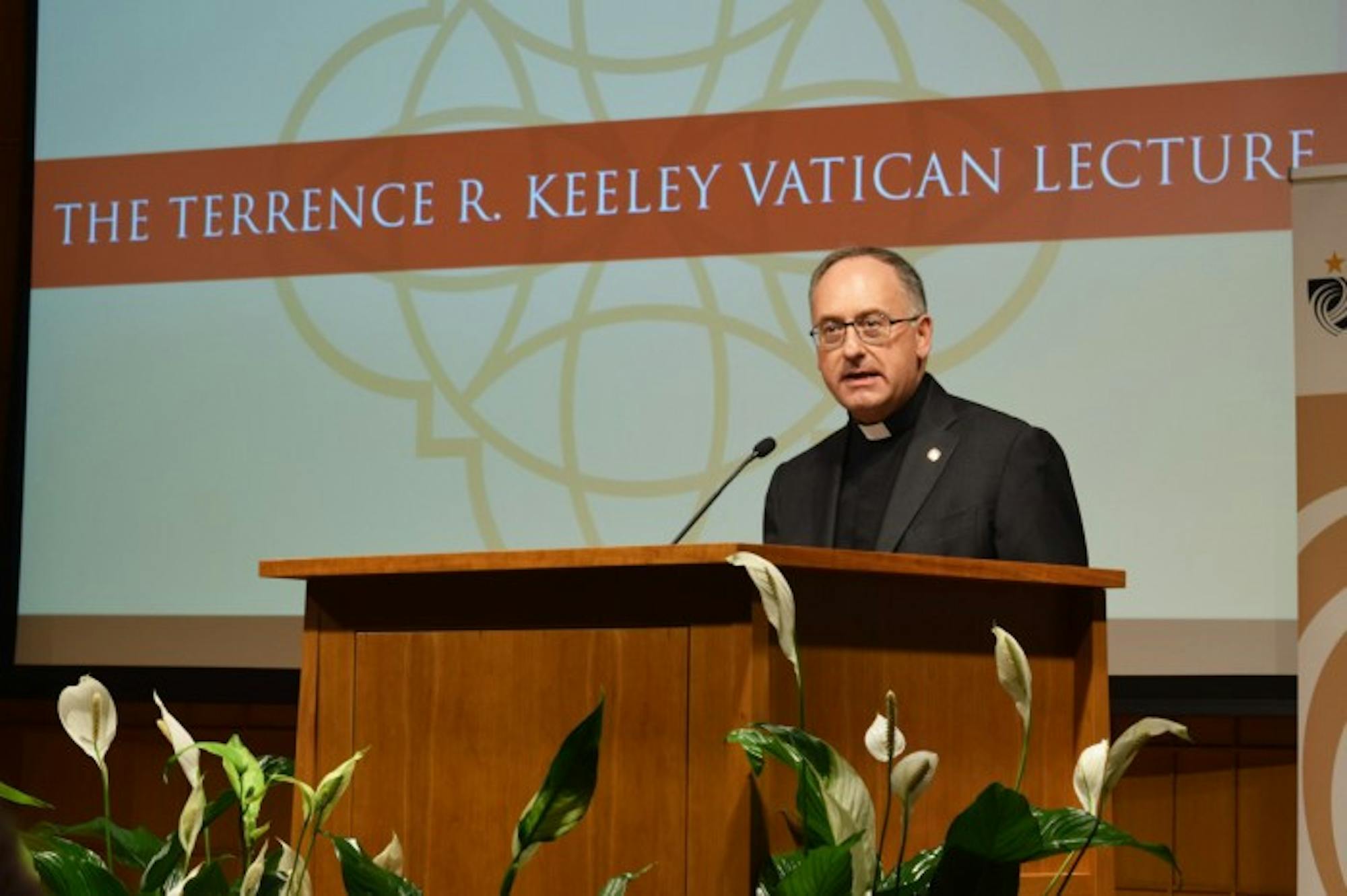Traveling to the corners of the world, Pope Francis has exemplified a “diplomacy of mercy,” Fr. Antonio Spadaro, the editor-in-chief of the Jesuit journal “La Civilta Cattolica,” said.
“For Pope Francis, mercy isn’t an abstract construct,” Spadaro said. “It is the action of God in the world.”
Spadaro delivered the Terrence R. Keeley Vatican Lecture on Tuesday at the Hesburgh Center for International Studies. The lecture, titled “The Geopolitics of Mercy,” explored the response of Francis and the Vatican to various crises across the world.
Spadaro said that in order to find God in the world, it is important for the church to put itself in the middle things. He described the Catholic Church as a “field hospital” amidst the world’s turmoil.
“If you want to find God, you have to go into the world,” Spadaro said.
Spadaro focused the lecture on the “seven phases” that constitute a “diplomacy of mercy.” He explained that the first phase is recognizing nothing is “definitively lost.” Spadaro talked about this phase through the context of Francis’ visit to the war-torn Central African Republic (CAR).
“Mercy can have a political effect,” Spadaro said. “The head of state of the CAR recognized the importance of mercy and wanted her country to find a new path of spirituality based on tolerance.”
The violence in the CAR is primarily between Christians and Muslims. Spadaro noted that as a means of encapsulating the importance of mercy, Francis visited a mosque in the capital of Bangui; the mosque was displaying a Vatican flag to welcome the Pontiff.
Spadaro said the second phase emphasizes flexibility and openness. He said that with this phase it is important to recognize individual humans’ unique qualities.
“Free will isn’t like dealing with machines,” Spadaro said.
To demonstrate his point, Spadaro listed some of the instances in recent years where the Catholic Church has served as a key mediator in international conflicts. He cited examples such as the Syrian Civil War, the Holy See’s relationship with the People’s Republic of China, relations between the United States and Cuba and the peace process in Colombia.
“For Francis, the history of the world is not a Hollywood movie in which our boys save us from their boys,” Spadaro said.
The main objective of the third phase is that geopolitics should “dissolve” fundamentalism, Spadaro said.
“The pope is light years away from a ‘clash of civilizations,’” Spadaro said. “He opposes using Christianity to justify an ‘axis of evil.’”
Spadaro blamed the “alliance” between religious fundamentalism and politics on a “fear of chaos.” He said fundamentalism is a “poor version” of a religious experience. He also said Francis believes that terrorists are “poor, criminal folk.”
“It is an expression that expresses condemnation and compassion,” Spadaro said. “We must see terrorists as an incarnation of the prodigal son and never as the incarnation of evil. What is the typical love of a Christian? It is the love of the enemy, not just the neighbor.”
The fifth phase stresses that Catholicism is not a “political guarantor” of power. Spadaro said the pope opposes the view that the Catholic Church is “the last empire” and religion shouldn’t be the guarantor of the dominant class.
Spadaro said the sixth phase is about acknowledging the peripheries of the world. He noted that Francis’ travels within Europe have taken him to places such as the island of Lampedusa — Europe’s “gateway,” Albania, Turkey, Poland and the South Caucasus among others.
“Francis is like a doctor, seeing [if] the heart works through seeing if the blood is moving throughout the body,” Spadaro said.
In describing the sixth phase, Spadaro returned to the idea of the church as a field hospital.
“Francis wants to travel to injured lands one by one,” Spadaro said.
Spadaro noted that the pontiff’s next scheduled trip is to Myanmar and Bangladesh, where there is an ongoing crisis between Muslim and Buddhist populations. He also talked about Francis’ recent visit to the Ciudad Juarez and the Mexican–American border.
“He was 10 meters from the border, celebrating Mass,” Spadaro said. “The United States was in front of him and Mexico is behind him. He cancelled the border, because there were people attending Mass on both sides.”
The seventh and final phase related to the theme of diplomacy as solidarity. He demonstrated his point by describing the gift the pope gave to President Donald Trump during their meeting earlier this year at the Vatican.
“It was a bronze sculpture of an olive tree with its branches growing together,” Spadaro said. “The pope expressed the need for justice.”













